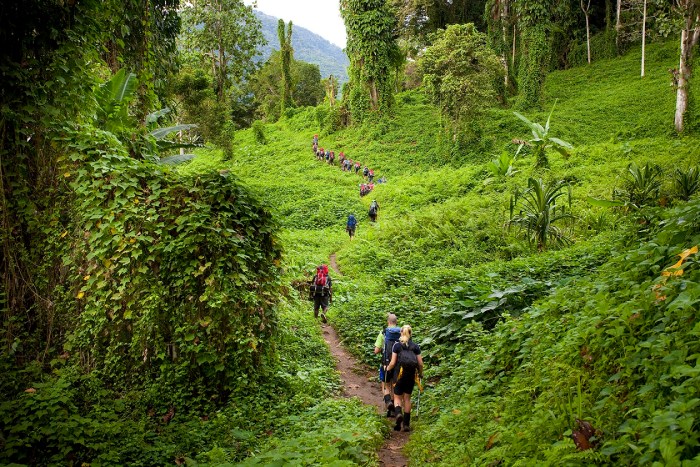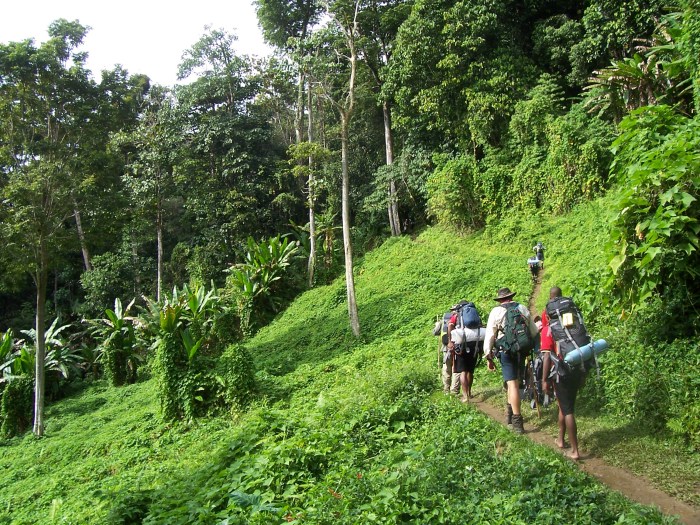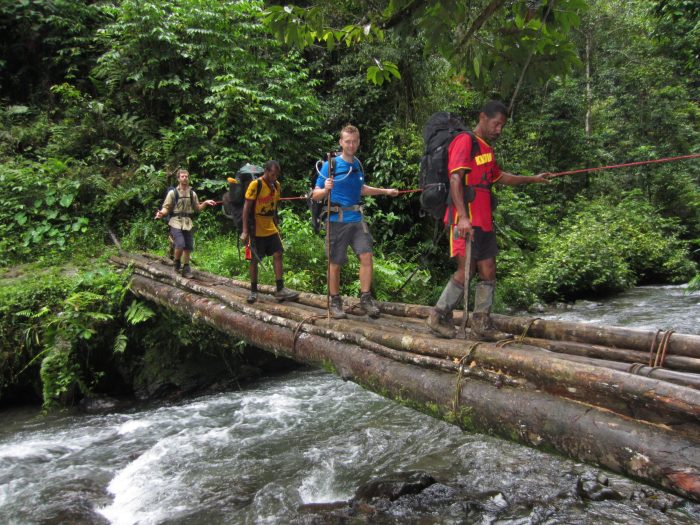Where Is Kokoda Trail? This captivating trail, nestled amidst the rugged mountains of Papua New Guinea, beckons adventure-seekers and history buffs alike. Its strategic significance during World War II and its profound cultural heritage make it a journey that transcends mere hiking and delves into the annals of human endurance and cultural preservation.
Prepare to traverse steep slopes, navigate rugged terrain, and immerse yourself in the rich traditions of the local people as we uncover the secrets of the Kokoda Trail.
Historical Significance of the Kokoda Trail
The Kokoda Trail, a rugged jungle path winding through the mountains of Papua New Guinea, holds immense historical significance due to its pivotal role in World War II.
During the Pacific War, the trail became a crucial strategic route for both the Allied and Japanese forces. The Japanese aimed to capture Port Moresby, the capital of Papua New Guinea, while the Allies sought to defend it. The trail served as the primary supply line for the Japanese and a vital defense line for the Allies.
The Kokoda Campaign
From July to November 1942, the Kokoda Trail was the site of intense fighting known as the Kokoda Campaign. The Japanese advanced along the trail, capturing key positions and threatening Port Moresby. However, the Australian forces, aided by Papuan guerrillas, mounted a fierce resistance, gradually pushing the Japanese back.
The campaign was characterized by brutal conditions, including dense jungle, treacherous terrain, and tropical diseases. Both sides suffered heavy casualties, and the fighting tested the limits of human endurance.
Strategic Importance
The Kokoda Trail’s strategic importance stemmed from its location and its role as a supply route. Controlling the trail gave the Japanese access to the Owen Stanley Ranges, which provided a vantage point over Port Moresby. Additionally, the trail served as a lifeline for the Japanese, allowing them to transport supplies and reinforcements to the front lines.
For the Allies, holding the trail was essential to preventing the Japanese from advancing further. By defending the trail, they could cut off Japanese supply lines and weaken their position in the region.
Legacy
The Kokoda Trail remains a symbol of the courage and sacrifice of the Australian and Papuan soldiers who fought there. The campaign is considered a turning point in the Pacific War, as it marked the beginning of the Allied counteroffensive against the Japanese.
Today, the trail is a popular destination for hikers and history enthusiasts, who come to experience the rugged terrain and pay homage to the fallen.
Geographic Location of the Kokoda Trail

The Kokoda Trail is located in Papua New Guinea, a country in the southwestern Pacific Ocean. The trail stretches approximately 96 kilometers (60 miles) through the rugged Owen Stanley Ranges in the southeastern part of the country.
Terrain and Climate
The Kokoda Trail passes through a variety of terrain, including dense rainforests, steep mountain ridges, and river crossings. The climate along the trail is tropical, with high humidity and rainfall throughout the year. Temperatures can vary significantly depending on altitude, with cooler temperatures in the higher elevations.
Map of the Trail
A map of the Kokoda Trail is provided below:

Physical Challenges of the Kokoda Trail
The Kokoda Trail is a challenging hike that requires a high level of fitness and preparation. The trail covers rugged terrain, with steep slopes, muddy tracks, and slippery river crossings. The weather conditions can also be extreme, with heavy rainfall and high humidity.
As a result, it is important to be well-trained and properly equipped before attempting the hike.
Steep Slopes
The Kokoda Trail is known for its steep slopes. Some sections of the trail are so steep that hikers must use ropes to climb or descend. The slopes can be particularly challenging in wet weather, when the track becomes slippery and muddy.
Rugged Terrain
The Kokoda Trail passes through a variety of terrain, including rainforests, mountains, and grasslands. The terrain is often rugged and uneven, with obstacles such as fallen trees, rocks, and roots. Hikers must be prepared to negotiate these obstacles, which can be difficult in wet weather.
Extreme Weather Conditions
The weather conditions on the Kokoda Trail can be extreme. The trail is located in a tropical climate, and the weather can change rapidly. Hikers must be prepared for heavy rainfall, high humidity, and hot temperatures. They must also be prepared for cold temperatures at night.
The Kokoda Trail is a famous hiking trail in Papua New Guinea. The trail is named after the village of Kokoda, which is located near the start of the trail. The Kokoda Trail is known for its beautiful scenery and its challenging terrain.
It is also a popular destination for birdwatchers, as the trail is home to a variety of bird species. If you are interested in learning more about the Red Sparrow Cast, you can check out the website Red Sparrow Cast . The Kokoda Trail is a great place to experience the beauty of Papua New Guinea.
Importance of Proper Training and Preparation
It is important to be well-trained and properly equipped before attempting the Kokoda Trail. Hikers should be able to hike for several hours at a time, and they should be comfortable with hiking on steep slopes and uneven terrain. They should also be prepared for extreme weather conditions.
Proper training and preparation will help to ensure a safe and enjoyable hike.
The Kokoda Trail, a challenging yet iconic hiking trail in Papua New Guinea, offers breathtaking views and a glimpse into the region’s rich history. Interestingly, this trail shares a connection with Anthony Kiedis, the lead singer of the Red Hot Chili Peppers.
His wife, Heather Christie , is a passionate hiker who has conquered the Kokoda Trail. Her journey on this trail further highlights the allure of this extraordinary destination, making it a must-visit for nature enthusiasts and adventure seekers alike.
Cultural Significance of the Kokoda Trail

The Kokoda Trail holds immense cultural significance for the people of Papua New Guinea. It serves as a living testament to their rich heritage and traditions, deeply intertwined with the land and its history.
The trail’s path traverses through the ancestral lands of several indigenous tribes, each with their unique customs and beliefs. For centuries, the trail has been a vital artery for trade, cultural exchange, and spiritual practices.
Role in Traditional Ceremonies and Rituals
The Kokoda Trail is deeply embedded in the cultural fabric of the local communities. It serves as a sacred pathway for traditional ceremonies and rituals, connecting the living to their ancestors and the spirit world.
- Initiation Rites:Young men undergo rigorous initiation rituals along the trail, marking their transition into adulthood and the responsibilities of manhood.
- Spirituality:The trail is believed to be inhabited by ancestral spirits, and rituals are performed to honor and appease them, ensuring the well-being of the community.
li> Pilgrimage:The trail has become a pilgrimage route for both locals and international visitors seeking spiritual connection and a deeper understanding of Papua New Guinea’s cultural heritage.
Preservation and Protection
Recognizing the immense cultural significance of the Kokoda Trail, efforts are underway to preserve and protect its heritage.
The Kokoda Trail is a famous trekking route in Papua New Guinea. It’s known for its historical significance and challenging terrain. If you’re planning a trek along the Kokoda Trail, you may want to consider unblocking someone on Snapchat. Here’s how to do it . After unblocking them, you can share your trekking experience with them on Snapchat.
- Community Involvement:Local communities are actively engaged in safeguarding the trail’s cultural integrity, working in partnership with government and conservation organizations.
- UNESCO World Heritage Status:The trail has been proposed for inclusion on the UNESCO World Heritage List, acknowledging its outstanding universal value and the need for international recognition and protection.
- Sustainable Tourism:Tourism along the trail is managed responsibly, ensuring that cultural practices and the environment are respected and preserved for future generations.
Tourism and the Kokoda Trail

The Kokoda Trail has emerged as a prominent tourist destination, attracting hikers from around the world. Its historical significance, stunning natural beauty, and challenging terrain have made it a popular destination for adventure seekers and history enthusiasts alike.
Tourism along the Kokoda Trail has brought substantial economic benefits to local communities. The influx of hikers has led to the creation of jobs in the tourism sector, including tour guides, porters, and accommodation providers. Local businesses have also benefited from increased demand for goods and services, such as food, supplies, and souvenirs.
Sustainable Tourism Practices, Where Is Kokoda Trail
To preserve the Kokoda Trail and its surroundings, sustainable tourism practices are crucial. This involves minimizing the environmental impact of tourism activities, such as waste management, trail maintenance, and responsible wildlife viewing. It also includes respecting local cultures and traditions, and supporting community-based tourism initiatives.
Practical Considerations for Hiking the Kokoda Trail
Planning and preparing for a hike on the Kokoda Trail require careful consideration of various factors. This section provides practical advice on essential gear, supplies, permits, trekking options, and the recommended duration of the hike.
Essential Gear and Supplies
Trekking the Kokoda Trail demands adequate gear and supplies. Backpacks with sufficient capacity, comfortable hiking boots, and trekking poles are crucial. Essential clothing includes moisture-wicking fabrics, rain gear, and a hat for sun protection. A first-aid kit, insect repellent, sunscreen, and water purification tablets are essential for safety and hygiene.
Permits and Regulations
Obtaining a trekking permit from the Kokoda Track Authority is mandatory. Permits can be acquired in advance or upon arrival at Kokoda village. Adhering to park regulations is vital to preserve the trail’s integrity and minimize environmental impact.
Trekking Options
The Kokoda Trail offers various trekking options to cater to different preferences and fitness levels. Guided treks, typically lasting 6-9 days, provide support and expertise. Self-guided treks offer flexibility but require prior experience and thorough preparation. The trail can also be completed in sections, allowing trekkers to customize their experience.
Recommended Duration
The recommended duration for hiking the Kokoda Trail is 6-9 days. This timeframe allows for a balanced pace, acclimatization to the challenging terrain, and sufficient time to appreciate the historical and cultural significance of the trail. However, trekkers with varying fitness levels and time constraints may adjust the duration accordingly.
Tips for Hiking the Kokoda Trail
Embarking on the Kokoda Trail is an adventure that requires preparation and a mindful approach. Here are some valuable tips to maximize your experience and ensure a safe and fulfilling journey.
Acclimatization
Before setting foot on the trail, allow ample time for acclimatization to the tropical climate. This will help reduce the risk of altitude sickness and heat-related illnesses. Spend a few days in Port Moresby or another lower-altitude location before beginning your trek.
Hydration
Staying hydrated is crucial throughout the hike. Carry plenty of water and electrolyte-rich drinks, and refill them regularly at designated water sources. Dehydration can lead to fatigue, headaches, and more severe health issues.
Injury Prevention
The Kokoda Trail poses physical challenges, so it’s essential to prioritize injury prevention. Wear supportive hiking boots that have been broken in, and use trekking poles for added stability. Warm up before each day’s hike and stretch regularly to reduce the risk of sprains, strains, and blisters.
Choosing a Tour Operator
Selecting a reputable tour operator is crucial for a safe and enjoyable experience. Look for operators with a proven track record, experienced guides, and a commitment to sustainable practices. Read reviews and ask for recommendations to ensure you’re making an informed choice.
Respecting Local Culture
The Kokoda Trail passes through villages and communities with unique customs and traditions. Be respectful of local culture, dress modestly, and ask permission before taking photographs. Engage with the locals and learn about their way of life to enrich your understanding of the region.
Ultimate Conclusion
The Kokoda Trail stands as a testament to the indomitable spirit of those who fought and lived along its path. Its physical challenges test the limits of human endurance, while its cultural significance offers a glimpse into the heart and soul of Papua New Guinea.
Whether you seek adventure, historical enlightenment, or cultural immersion, the Kokoda Trail promises an unforgettable experience that will linger in your memory long after you’ve completed your trek.
Clarifying Questions: Where Is Kokoda Trail
What is the length of the Kokoda Trail?
The Kokoda Trail stretches approximately 96 kilometers (60 miles) from Owers’ Corner to Kokoda.
What is the best time to hike the Kokoda Trail?
The dry season, from April to October, offers the most favorable conditions for hiking the Kokoda Trail.
Is it possible to hike the Kokoda Trail independently?
While it is technically possible, it is strongly recommended to hike the Kokoda Trail with a reputable tour operator for safety and logistical reasons.